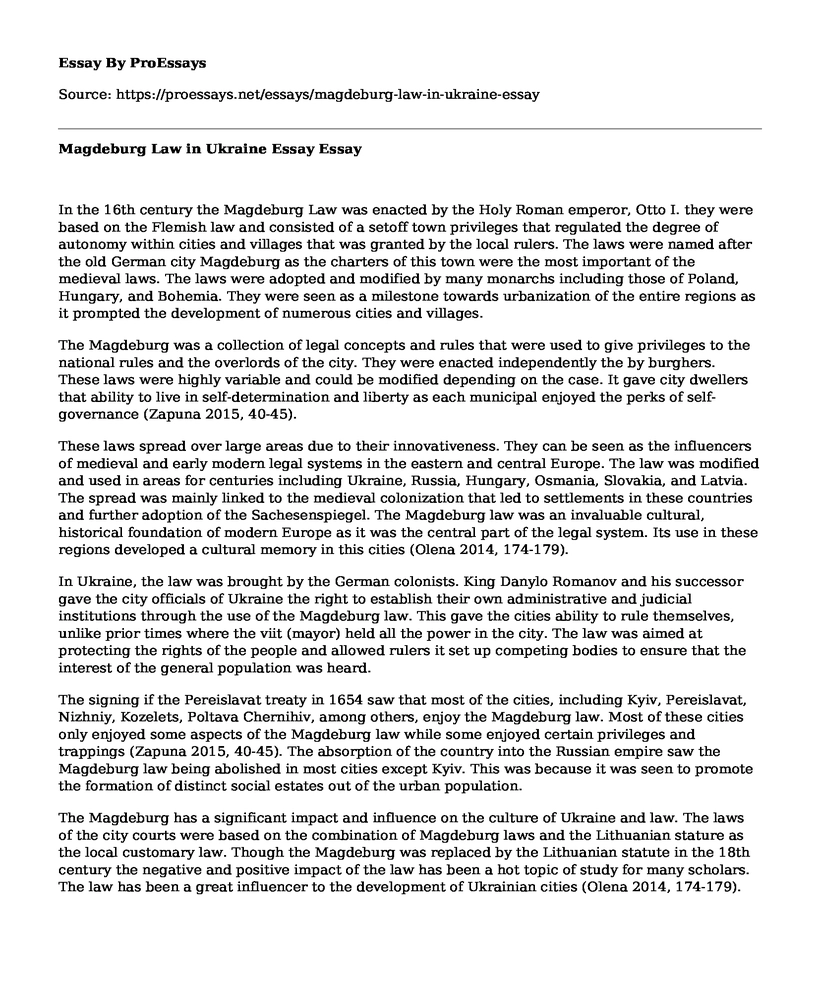In the 16th century the Magdeburg Law was enacted by the Holy Roman emperor, Otto I. they were based on the Flemish law and consisted of a setoff town privileges that regulated the degree of autonomy within cities and villages that was granted by the local rulers. The laws were named after the old German city Magdeburg as the charters of this town were the most important of the medieval laws. The laws were adopted and modified by many monarchs including those of Poland, Hungary, and Bohemia. They were seen as a milestone towards urbanization of the entire regions as it prompted the development of numerous cities and villages.
The Magdeburg was a collection of legal concepts and rules that were used to give privileges to the national rules and the overlords of the city. They were enacted independently the by burghers. These laws were highly variable and could be modified depending on the case. It gave city dwellers that ability to live in self-determination and liberty as each municipal enjoyed the perks of self-governance (Zapuna 2015, 40-45).
These laws spread over large areas due to their innovativeness. They can be seen as the influencers of medieval and early modern legal systems in the eastern and central Europe. The law was modified and used in areas for centuries including Ukraine, Russia, Hungary, Osmania, Slovakia, and Latvia. The spread was mainly linked to the medieval colonization that led to settlements in these countries and further adoption of the Sachesenspiegel. The Magdeburg law was an invaluable cultural, historical foundation of modern Europe as it was the central part of the legal system. Its use in these regions developed a cultural memory in this cities (Olena 2014, 174-179).
In Ukraine, the law was brought by the German colonists. King Danylo Romanov and his successor gave the city officials of Ukraine the right to establish their own administrative and judicial institutions through the use of the Magdeburg law. This gave the cities ability to rule themselves, unlike prior times where the viit (mayor) held all the power in the city. The law was aimed at protecting the rights of the people and allowed rulers it set up competing bodies to ensure that the interest of the general population was heard.
The signing if the Pereislavat treaty in 1654 saw that most of the cities, including Kyiv, Pereislavat, Nizhniy, Kozelets, Poltava Chernihiv, among others, enjoy the Magdeburg law. Most of these cities only enjoyed some aspects of the Magdeburg law while some enjoyed certain privileges and trappings (Zapuna 2015, 40-45). The absorption of the country into the Russian empire saw the Magdeburg law being abolished in most cities except Kyiv. This was because it was seen to promote the formation of distinct social estates out of the urban population.
The Magdeburg has a significant impact and influence on the culture of Ukraine and law. The laws of the city courts were based on the combination of Magdeburg laws and the Lithuanian stature as the local customary law. Though the Magdeburg was replaced by the Lithuanian statute in the 18th century the negative and positive impact of the law has been a hot topic of study for many scholars. The law has been a great influencer to the development of Ukrainian cities (Olena 2014, 174-179).
Bibliography
Zapuna, Ievgeniia. 2015. "Types of Planning Structures of Small Historic Towns Of Ukraine." Science: Future Of Lithuania 7, no. 1: 40-45
Olena, Malozhon. 2014. "Social and legal relations on ethnic Ukrainian lands: XIV - the first half of the XVI centuries." National Academy of Managerial Staff Of Culture & Arts Herald no. 4: 174-179.
2017. "Magdeburg." Columbia Electronic Encyclopedia, 6Th Edition 1 (accessed March 16, 2018).
Cite this page
Magdeburg Law in Ukraine Essay. (2022, Apr 04). Retrieved from https://proessays.net/essays/magdeburg-law-in-ukraine-essay
If you are the original author of this essay and no longer wish to have it published on the ProEssays website, please click below to request its removal:
- The History of Gun Control in the United States
- Dangers in Police Work Are Realized When Police Die in Line of Duty
- Critique of Linda Hasselstrom's "a Peaceful Woman Explains Why She Carries a Gun"
- Community Correction System: Halfway Houses Paper Example
- Essay Sample on Rights and Special Circumstances
- Victim Participation in the Criminal Justice System Essay Example
- The Legacy of Maggie L. Walker: An Iconic Entrepreneur & Civil Rights Activist - Essay Sample







